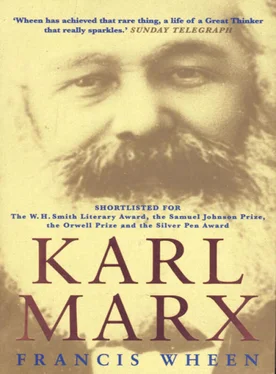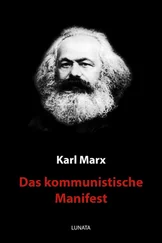Some would sit on the bed or on the trunks, others would stand and walk about. They would all smoke terrifically and argue with great passion and excitement. It was impossible to open the windows, because a crowd would immediately have gathered in the street to find out the cause of the violent uproar, and very soon the room was concealed in such a thick cloud of tobacco smoke that it was impossible for a newcomer to recognise anyone present. In the end, we ourselves could not even recognise each other.
Which was probably just as well, if both Marx and Ruge were in attendance: otherwise the ‘violent uproar’ might have degenerated into fisticuffs.
The two enemies continued their feud in the public prints instead. In July 1844, signing himself merely ‘A Prussian’, Ruge wrote a long article for Vorwärts! about the Prussian King’s brutal suppression of the Silesian weavers, who had smashed the machines which were threatening their livelihoods. He regarded the weavers’ revolt as an inconsequential nothing, since Germany lacked the ‘political consciousness’ necessary to transform an isolated act of disobedience into a full-dress revolution.
Marx’s reply, published ten days later, argued that the fertiliser of revolutions was not ‘political consciousness’ but class consciousness, which the Silesians had in abundance. Ruge (or ‘the alleged Prussian’, as Marx called him) thought that a social revolution without a political soul was impossible; Marx dismissed this ‘nonsensical concoction’, maintaining that all revolutions are both social and political in so far as they dissolve the old society and overthrow the old power. Even if the revolution occurred in just one factory district, as with the Silesian weavers, it still threatened the whole state because ‘ it represents man’s protestagainst a dehumanised life’. This was too optimistic by half. The only lasting influence of the revolt was that it inspired one of Heine’s most celebrated verses, ‘The Song of the Silesian Weavers’, which was published in the same issue of Vorwärts! .
‘The German proletariat is the theoretician of the European proletariat, just as the English proletariat is its economist, and the French proletariat its politician,’ Marx wrote in his riposte to Ruge, prefiguring a later assessment by Engels that Marxism itself was a hybrid of these three bloodlines. The twenty-six-year-old Marx was already well versed in German philosophy and French socialism; now he set about educating himself in the dismal science. During the summer of 1844 he read his way systematically through the main corpus of British political economy – Adam Smith, David Ricardo, James Mill – and scribbled a running commentary as he went along. These notes, which run to about 50,000 words, were not discovered until the 1930s, when the Soviet scholar David Ryazanov published them under the title Economic and Philosophical Manuscripts . They are now more commonly known as the Paris manuscripts.
Marx’s work has often been dismissed as ‘crude dogma’, usually by people who give no evidence of having read him. It would be a useful exercise to force these extempore critics – who include the present British prime minister, Tony Blair – to study the Paris manuscripts, which reveal the workings of a ceaselessly inquisitive, subtle and undogmatic mind.
The first manuscript begins with a simple declaration: ‘Wages are determined by the fierce struggle between capitalist and worker. The capitalist inevitably wins. The capitalist can live longer without the worker than the worker can without him.’ From this premiss all else follows. The worker has become just another commodity in search of a buyer; and it isn’t a seller’s market. Whatever happens, the worker loses out. If the wealth of society is decreasing, the worker suffers most. But what of a society which is prospering? ‘This condition is the only one favourable to the worker. Here competition takes place among the capitalists. The demand for workers outstrips supply. But …’
But indeed. Capital is nothing more than the accumulated fruits of labour, and so a country’s capitals and revenues grow only ‘when more and more of the worker’s products are being taken from him, when his own labour increasingly confronts him as alien property and the means of his existence and of his activity are increasingly concentrated in the hands of the capitalist’ – rather as an intelligent chicken (if such an unlikely creature existed) would be most conscious of its impotence when at its most fertile, laying dozens of eggs only to see them snatched away while still warm.
Furthermore, in a prosperous society there will be a growing concentration of capital and more intense competition. ‘The big capitalists ruin the small ones and a section of the former capitalists sinks into the class of the workers which, because of this increase in numbers, suffers a further depression of wages and becomes ever more dependent on the handful of big capitalists. Because the number of capitalists has fallen, competition for workers hardly exists any longer, and because the number of workers has increased, the competition among them has become all the more considerable, unnatural and violent.’
So, Marx concludes, even in the most propitious economic conditions, the only consequence for the worker is ‘overwork and early death, reduction to a machine, enslavement to capital’. The division of labour makes him more dependent still, introducing competition from machines as well as men. ‘Since the worker has been reduced to a machine, the machine can confront him as a competitor.’ Finally, the accumulation of capital enables industry to turn out an ever greater quantity of products. This leads to overproduction and ends up either by putting a large number of workers out of a job or by reducing their wages to a pittance. ‘Such,’ Marx concluded with bleak irony, ‘are the consequences of a condition of society which is most favourable to the worker, i.e. a condition of growing wealth. But in the long run the time will come when this state of growth reaches a peak. What is the situation of the worker then?’ Pretty miserable, you won’t be surprised to learn.
The odds were hopelessly stacked in capital’s favour. A big industrialist can sit on the products of his factory until they fetch a decent price, whereas the worker’s only product – the sweat of his brow – loses its value completely if it is not sold at every instant. A day’s missed toil is as worthless in the market as yesterday morning’s newspaper, and can never be recovered. ‘Labour is life, and if life is not exchanged every day for food it suffers and soon perishes.’ Unlike other commodities, labour can be neither accumulated nor saved – not by the labourer, at any rate. The employer is more fortunate, since capital is ‘stored-up labour’ with an indefinite shelf-life.
The only defence against capitalism was competition, which raises wages and cheapens prices. But for this very reason the big capitalists would always try to thwart or sabotage competitiveness. Just as the old feudal landlords operated a monopoly of land – for which the demand was almost limitless, but the supply finite – so the new breed of industrialists sought a monopoly of production. It was therefore foolish to conclude, as Adam Smith had, that the interest of the landlord or the capitalist is identical with that of society. ‘Under the rule of private property, the interest which any individual has in society is in inverse proportion to the interest which society has in him, just as the interest of the moneylender in the spendthrift is not at all identical with the interest of the spendthrift.’
Marx had a strong if critical respect for Smith and Ricardo. As with Hegel, he used their own words and logic to expose the shortcomings of their theories. And the most obvious shortcoming was this: ‘Political economy proceeds from the fact of private property. It does not explain it.’ Classical economists treated private property as a primordial human condition, rather as theology explained the existence of evil by reference to man’s first disobedience and the fruit of that forbidden tree whose mortal taste brought death into the world.
Читать дальше












